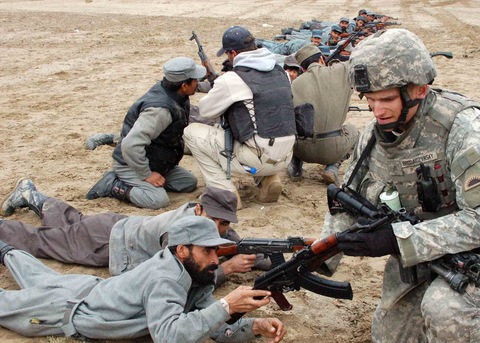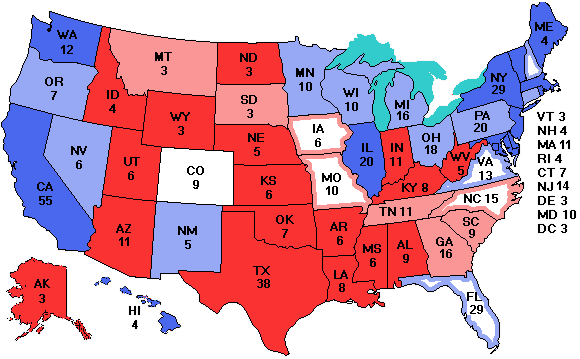...
 |
Make no mistake, ladies and gentlemen:
I'm for freedom. And liberty. Liberty's good too |
The general theory is that a politician wins an election by convincing the largest number of voters that he or she will enact policies that they believe will make their lives better. Traditionally, this has resulted in campaigns taking two broadly parallel approaches. They make promises that they will implement certain specific policies - with the intent that more people will approve of these policies than will dislike them - and they attempt to demonstrate that their political opponent will implement certain specific policies that will make their lives worse. There is a great deal of flexibility in how a campaign might handle these two overlapping goals, up to and including outright lies, but in the end the conventional wisdom has always been that you described in some detail what you would actually do if elected.
In fact, this sometimes leads to some rather laughable promises. Particularly in cases like the American Presidential election, the entire conversation often utterly ignores the constitutional limitations on the president's powers. When you hear a candidate promise to "reform the tax code" or "defund Planned Parenthood" it's important to realize that these are not his or her decision to make, and in fact are entirely dependent upon the political makeup of the Legislature. If the Presidential candidate was honest in these matters, he could promise what he would veto, and what he would advocate, but he could not say what he would pass. For that matter, if the people truly understood the way the separation of powers works in Washington they would place significantly less importance on the Presidential election and more on electing legislative majorities.
But this is 2012, and, as you might have heard, everything has changed. Due to some profound divisions in the rank and file of the Republican party, the GOP found itself unable to nominate a candidate who was at once competent, qualified and viable. The demands for extreme right-wing purity - primarily characterized by a steadfast refusal to compromise at any time on any issue - eliminated or scared off most of the seasoned, mainstream Republican politicians, and many of those favored by the extreme tea-partying wing of the party were political lightweights, bumblers who had no hope of funding and running a real national campaign. But from the ruins of the Republican primary season their arose one man, handsome, rich, well dressed, with all the charisma of an old sneaker and a highly suspicious history of liberal policies. But Mitt Romney had one thing to offer that no other candidate had the audacity to match - he was willing to say anything, literally ANYTHING to be elected President. So as unlikely as it seemed, he relentlessly transformed himself into a "severe conservative", repudiating everything he ever did and believed, and promising fealty to whatever was demanded of him by the extreme right. And it appears to have worked. Barring some utter collapse, the party will nominate Romney at their convention in Tampa later this month.
But in spite of his promised commitment to all things conservative, from the Ryan budget plan to war with Iran, he still has much baggage. His religion and his earlier positions on abortion, immigration and gay rights are a problem, and his signature Massachusetts health care program, dubbed RomneyCare, is pure socialist anathema to movement conservatives. While he is being cautiously accepted to lead the party, there is significant distrust amongst the rank and file. And this leaves Mitt in a difficult position going into the final months of the campaign.
While he absolutely needs these most extreme right-wing supporters, they do not, by themselves, constitute an electoral majority. Most Presidential candidates have pandered to their base voters during the Primaries, then, after securing the nomination, have historically "tacked to the center" in the general election campaign. But Romney can't count on the unconditional support of the base, and if he tries to back away from their most fondly held positions on matters from immigration to tax policy to gay rights in order to secure the votes of more moderate Republicans that he would need to be elected, he risks antagonizing the base and possibly losing more votes than he gains. Ultimately, he needs to appeal to two different constituencies, each of which supports a substantially different policy agenda. And he has to end up with large voting majorities from each constituency in order to win the election.
So how can his campaign possibly thread that needle? The strategy they have decided on is to simply refuse to commit to any specific policy positions. He says he'll pursue a massive multi-trillion dollar tax cut, but that it will not increase the deficit because of his tax reform plan. But he won't tell us what his tax reform plan actually is. He says he'll add 12 million private sector jobs in his first term, but he won't say how. He says his economic agenda is different from GW Bush's, and his foreign policy would be different from Obama's but what little we know or can intuit about them indicates they would actually be functionally identical. He won't release his taxes, he won't take a position on immigration (beyond some generic Mexican - bashing) and he won't say what he'd do in Afghanistan.
All of which leaves us with two questions. Can Romney possibly try to continue this complete unwillingness to offer specific information about his policies, and if he does, can it possibly be a successful campaign strategy? He clearly would like to be able to get through to November 6th without having to risk alienating any voters. He's made a similar strategic calculation around releasing his tax returns - whatever political costs he incurs by not releasing them, the information contained in them would have even worse consequences if he did release them. But it seems like a terribly rich vein to be mined by the Obama campaign. After all, what could be more frightening than a potential political leader who refused to say what he'd do if elected? In the end, I cannot believe that a Presidential candidate can be elected without at least offering some clarity as to his preferred policies. To merely promise outcomes - 12 million jobs, balanced budget - without some willingness to explain how they would be created seems certain to generate deep doubts in all but the most ardent of supporters. Throughout the campaign, Romney would be exposed to all sorts of accusations about his favored policies, accusations he would find difficult to refute without offering specifics. And ultimately, there will be televised debates. I can't see any way for a candidate to get through a debate while remaining vague on all the important issues. After a couple hours of refusing to take any political positions, he's going to look weak and foolish, and Americans don't like weak and foolish leaders. And if I'm wrong and a campaign of vague and ambiguous platitudes and disingenuous generalities does lead to a victory in November, it would be the final nail in the coffin of American electoral politics. Because it would mean we had reached the point where substance doesn't matter - it's no longer anything more than a popularity contest that allows lying.
...







